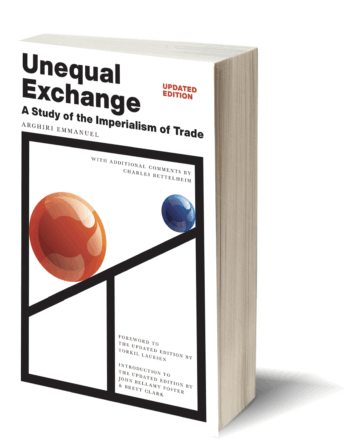February 1, 2026
In this talk from the inaugural conference of the Society for Peace, Internationalism, and Ecology, John Bellamy Foster relates the story of Prometheus, as presented in the plays of Aeschylus, to Western Marxism's "dialectic of defeat," in which capitalism is portrayed as an unbreakable bond for the working class. Instead, Foster says, we must recognize Prometheus as a subject who is freed from the seemingly inescapable fetters imposed upon him.
February 1, 2026
Speaking before at the Opening Ceremony of the Fourth World Conference on Marxism in Beijing, John Bellamy Foster discusses the development of eco-Marxism and its relation to Marxist theory. Here, Foster argues, "eco-Marxism as we know it today is not simply another branch of Marxism," but is a pathway to the projects of complete socialism and ecological civilization.
February 1, 2026
Paul Buhle reviews
Insectopolis: A Natural History, a new graphic novel by Peter Kuper. In the book, Kuper, a prolific producer and publisher of left-wing comics, spins a tale of two siblings who find themselves in a world of insects. Through encounters with butterflies, beetles, ants, and more, Kuper reveals the deep entanglements between human society—at its best and worst—and the creatures of its living environment.
January 1, 2026
In this Introduction to the updated edition of
Unequal Exchange by Arghiri Emmanuel, published by Monthly Review Press, John Bellamy Foster and Brett Clark offer readers insight into the continuing influence of Emmanuel's seminal work. Through both deep understanding thoughtful critique, the authors deftly situate Emmanuel's text as an indispensable part of an enduring tradition of Marxist analysis of the global dynamics of labor.
January 1, 2026
David E. Perlman and Ashly Vigneault explore the linkages between humanity's metabolic rift with nature and the accelerating emergence of epidemics, which are fundamentally related to the capitalist mode of production and concomitant alienated social metabolism. Using historical and epidemiological research that extends from the rise of the bubonic plague to the emergence of COVID-19, Perlman and Vigneault are able to deftly tie these concepts to the breach of planetary boundaries that threatens all of humanity.
December 1, 2025
John Bellamy Foster introduces our special issue celebrating the life and work of
MR former coeditor and MR Press author Robert W. McChesney. In his recounting of over 50 years of close friendship and collaboration, Foster paints a portrait of McChesney as a visionary intellectual and activist whose work will reverberate through the communication field for decades to come.
December 1, 2025
In this transcript of a talk from 2015, Robert W. McChesney discusses the "great definitional communication revolutions" that have shaped humanity's trajectory. Even a decade ago, McChesney was able to see the fraught relationship between new technology and democracy, the re-emergence of fascism, and the political dangers of the Digital Age.
December 1, 2025
To conclude our special issue on Robert W. McChesney's legacy,
MR presents a series of tributes capturing his impact on the world around him. The diversity represented by these illustrious contributors, from his colleagues at the media watch group Fairness and Accuracy in Reporting (FAIR) to Senator Bernie Sanders, is a testament to McChesney's enduring influence.
November 1, 2025
In Aeschylus’s play
Prometheus Bound, the Prometheus is a revolutionary figure. Defying divine interdiction to bring fire to humanity, the Titan has since been adopted by thinkers from the Enlightenment to today to represent revolutionary forces in human existence. So, John Bellamy Foster asks in November’s Review of the Month, what is “Prometheanism,” and how has the term been used (and misused) in discussions of Marx, the ecological crisis, and sustainable human development?
November 1, 2025
In this far-reaching analysis, Vijay Prashad enumerates the conditions of the current conjuncture that, despite seemingly intractable capitalist and imperialist hegemony, point to a reinvigorated revolutionary consciousness among the global population. In a world of capitalist degradation, Prashad declares: "A politics to produce dignity is a socialist politics…. Capitalism inherently generates forms of inequality and indignity. Therefore, all undertakings that seek dignity for all are socialist projects."










